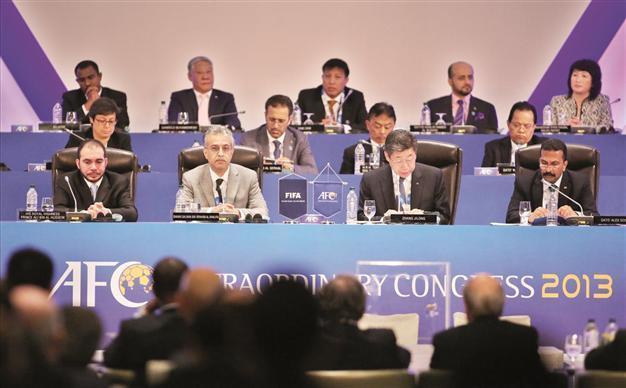Controversial sheikh romps to Asian football presidency
KUALA LUMPUR

(L-R) FIFA Vice President Prince Ali Al Hussein from Jordan, newly elected Asian Football Confederation (AFC) President Sheikh Salman bin Ebrahim Al Khalifa, AFC Vice President Zhang Jilong and AFC General Secretary Alex Soosay attend the AFC Extraordinary Congress 2013 in Kuala Lumpur. Sheikh Salman became scandal-hit Asian football’s new leader with a landslide election win. AFP photo
Bahrain royal Sheikh Salman bin Ebrahim Al Khalifa promised a new era of transparency and openness yesterday as he became the leader of scandal-hit Asian football with a landslide election win. The sheikh, shrugging off accusations of outside interference and even human rights abuses, won 33 of the 46 votes to become president of the Asian Football Confederation (AFC), replacing disgraced ex-leader Mohamed bin Hammam.
With Yousef Al Serkal of the UAE and Thailand’s Worawi Makudi gathering just six and seven votes respectively, it was a crushing victory for Sheikh Salman who will now complete bin Hammam’s current term, which finishes in 2015.
The Bahrain football association chief also beat Qatar’s Hassan Al Thawadi in a separate vote for a seat on FIFA’s executive committee, giving him a voice at the top of football’s world governing body.
“My mission is to reunite our confederation. My mission is to lead our family towards a future of growth and prosperity, a future based on good governance and integrity,” Sheikh Salman said. “Today, the Asian football family is at a crossroads. Today we have the power to erase a chapter in our history.”
Sheikh Salman was referring to the spectacular demise of Qatar’s bin Hammam, who challenged for the FIFA presidency but was accused of vote-buying and then of financial wrongdoing in office. He stepped down last year.
Sheikh Salman had been under fire before the vote over claims that the Olympic Council of Asia (OCA) was lobbying on his behalf. He faced similar accusations when he unsuccessfully challenged bin Hammam in 2009.
Human rights criticismHuman rights groups also accused the sheikh of orchestrating a purge of players and officials, who they said were then arrested and tortured, during Bahrain’s crackdown on pro-democracy protests in 2011. After his victory, Sheikh Salman promised to be a “strong leader” who would implement “principles of good governance at every level”, decentralised leadership and a code of ethics based on the FIFA model. “What we need are concrete reforms, steps that can be implemented and measured. What we need is an AFC where the decision-makers are accountable,” he said, promising to “clean up the past”.
FIFA chief Sepp Blatter, heading a contingent of world football dignitaries in Kuala Lumpur for the vote, hailed its “total transparency.” “I wish [Sheikh Salman] a lot of success, a lot a patience but also it’s certain that Asian football is going to travel a difficult road now to renew this great confederation,” he said.
Serkal, an AFC vice president and head of the UAE football association, also said he had “no hard feelings” and would work with Sheikh Salman regardless of any meddling in the vote.
“Whether there was outside interference or wasn’t outside interference, it’s not for me to judge... even if there was, I will still accept the result,” he said. Claims of dirty tricks dominated the build-up to the vote, with the OCA accused of lobbying on behalf of Sheikh Salman, and FIFA expressing concern about allegations that bin Hammam had also been active behind the scenes. And former Saudi Arabian candidate Hafez Ibrahim Al Medlej, who withdrew from the race late on May 1, also suggested that FIFA had brought its influence to bear on the process.
Australia’s Moya Dodd was anointed as the AFC’s mandatory female vice president, and two other women, North Korea’s Han Un-Gyong and Palestinian candidate Susan Shalabi, earned executive committee seats.
